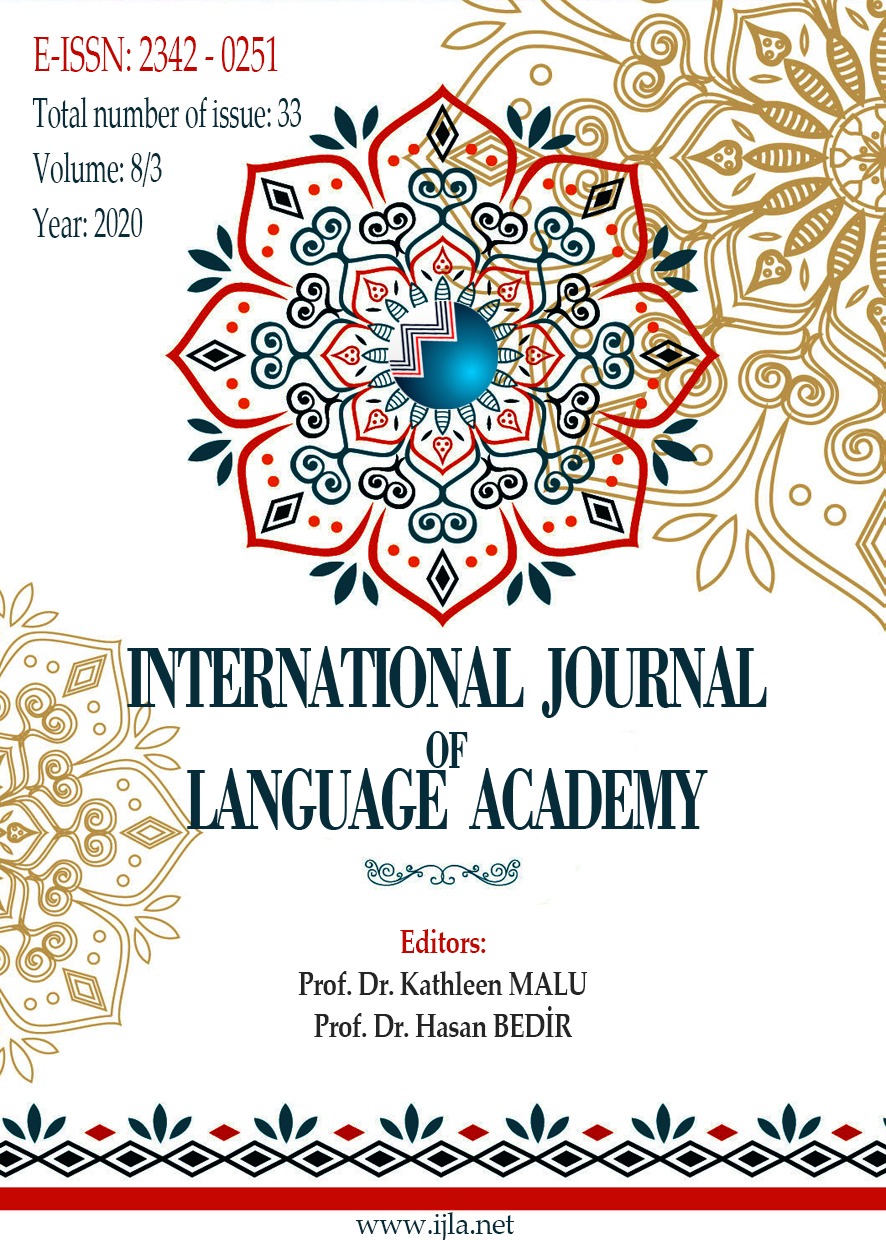Author :
Abstract
Sözlüksel alan terimi, aynı kavram etrafında toplanabilen, aynı kavramsal imgeyi zihinde canlandıran yapısal düzen şeklinde tanımlanabilir. Sözlüksel alan teriminin karşılığı ancak aynı metin içerisinde bulunabilir. Bir metin içerisinde yer alan, aynı konu etrafında bir araya gelebilen terimler, o konunun sözlüksel alanını oluştururlar. Bu görüşün temelinde, Humbolt vb. düşünürlerin, dünya görüşünün temelini dil penceresinin oluşturması yer alır. Bir metin içerisinde sözlüksel alan oluşturan terimlerin tespiti; metin oluşturan yazarın imge dünyasını ortaya koyar. Anlam, dilde yer alan bağımlı ve bağımsız biçimbirimlerin bağlamda bir araya gelmesi ve sözdizimsel ilişkiler kurması sonucunda bir dizge oluşturur ve bu şekilde oluşan dizgede ortaya çıkan gösterge, sözcüğün anlamını karşılamaktadır. Berke Vardar’a göre, dilsel alan 3 aşamadan oluşur. Kavramsal alan, dil dışı kavramları ifade eder. Sözlüksel alan, göstergelerin birbiri ile ilişkisini anlam yönünden ifade eder. Anlamsal alan da, kavramsal ve sözlüksel alanların etkileşimini anlatır. Kavram alanı kuramının temel noktasını, göstergelerde ortaya çıkan anlamların birbiri ile etkileşime geçmesi ve bu göstergelerin bir ağ ortaya çıkarması oluşturur. Bu çalışmada da sözlüksel alan hakkında yapılan çalışmalar hakkında bilgi verilecek ve Âşık Veysel’in şiirlerinde yer alan ve sözlüksel alan oluşturan terimler tespit edilerek bir sınıflandırma yapılacaktır. Yapılan bu sınıflandırma ile şâirin dünyaya bakış açısı, imge dünyası ve okuyucuya iletmek istediği mesajlar dilbilim alanının bakış açısı ile ortaya konmaya çalışılacaktır.
Keywords
Abstract
The term lexical field can be defined as a structural order that can be gathered around the same concept, visualizing the same conceptual image. The equivalent of the lexical field term can only be found in the same text. The terms in a text that can come together around the same subject form the lexical field of that subject. On the basis of this view, Humbolt and so on. thinkers, the basis of the world view is the language window. Determination of terms that form lexical fields in a text; reveals the image world of the author who creates the text. Meaning creates a string as a result of the combination of dependent and independent morphemes in the language and establishing syntactic relations in the context, and the indicator that occurs in the string formed in this way meets the meaning of the word. According to Berke Vardar, the linguistic field consists of 3 stages. Conceptual field refers to non-linguistic concepts. The lexical field expresses the relationship between the indicators in terms of meaning. The semantic field also describes the interaction of the conceptual and lexical fields. The basis of concept field theory; It is based on the notion that the concepts are not isolated individually, but as a mosaic, they limit and influence each other. In this study, information will be given about the studies on lexical field and a classification will be made by determining the lexical terms in Âşık Veysel's poems. With this classification, the point of view of poet to the world, the image world and the messages she wants to convey to the reader will be tried to be revealed from the perspective of linguistics.
Keywords
- Aksan, D. (2016). Anlambilim. Ankara: Bilgi Yayınevi.
- Alptekin, A. B. (2007). Âşık Veysel Türküz Türkü çağırırız. Ankara: Akçağ Yayınları.
- Kıran, Z.- Kıran, Eziler A. (2013). Dilbilime giriş. Ankara: Seçkin Yayıncılık.
- Sert, G. (2019). Anlam alanı ve anlam ezgisi açısından eş anlamlı durum sıfatları: “muhtemel” ve “olası” örneği, Teke, Sayı: 8/1, s. 93.121. doi: http://dx.doi.org/10.7884/teke.4395
- Toklu, O. (2015). Dilbilime giriş. Akçağ Yayınları: Ankara.
- Vardar, B. (2002). Açıklamalı dilbilim terimleri sözlüğü. İstanbul: Multilingual.





